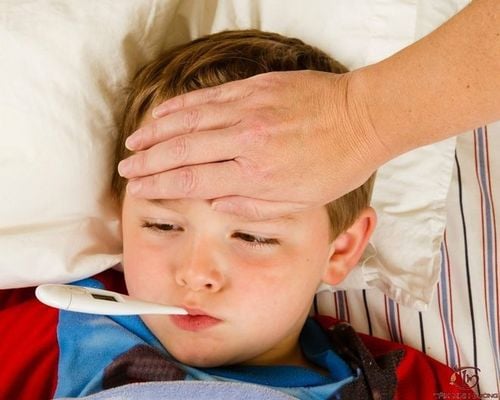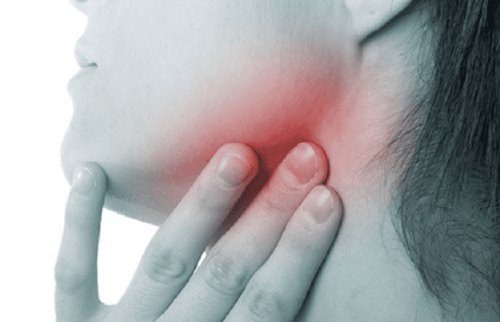This is an automatically translated article.
The article is professionally consulted by Master, Doctor Nguyen Thi Nhat - Infectious Disease Specialist - Department of Medical Examination & Internal Medicine - Vinmec Hai Phong International General Hospital.
Usually, when sick with mumps, the patient will have a fever of 38 - 39 degrees Celsius, have symptoms of headache, loss of appetite, difficulty swallowing, swollen lymph nodes,... However, about one-third of the patients. Mumps does not have a fever and does not show any of the above symptoms.
1. Symptoms of mumps
Mumps is caused by a virus that belongs to the group of Paramyxoviruses. The disease is transmitted by the respiratory route, through aerosols of the breath, transmitted directly from sick people to healthy people. The disease is common in many places and often breaks out into epidemics in places with large crowds such as kindergartens, schools,...The incubation period lasts 18 to 25 days, at this stage, the sick person will not have any symptoms.
However, when entering the onset period, people with mumps will have symptoms of fever 38 -39 degrees Celsius, headache, loss of appetite, difficulty swallowing, difficulty speaking, pain in joints.
When reaching the full-blown stage, that is, after 24-48 hours of fever, the patient will have symptoms of parotid gland inflammation, examination finds that the mouth of the Stenon tube is edematous, swollen but no pus draining. At first, swelling on one side, after 1-2 days swelling on the other side (usually swelling on both sides, rarely swelling on one side). The two swollen sides are often asymmetrical (the swollen side is big, the swollen side is small), stretchy, glossy, pressing is not concave, hot to the touch, painful.
The skin in the swollen area is normal in color, not red and elastic.

2. Does mumps have swollen lymph nodes?
Usually, the disease clears up on its own within 10 days, the fever goes away after 3-4 days, and the salivary glands stop swelling within 8-10 days. However, about a third of patients with mumps have no symptoms. Specifically, people with mumps do not have fever, parotid glands do not have lymph nodes,...Because people with mumps do not have a fever, there are no symptoms of the disease, so sometimes the disease passes without knowing it, leading to Patients cannot prevent the disease to avoid dangerous complications.
3. Complications of mumps?
Mumps in adults is often severe and has more complications than children, if not detected early and treated promptly, there may be complications such as:Orchitis: Common in puberty, Rarely in children under 2 years old and adults over 40 years old, appearing 1-2 weeks after parotid gland swelling. Patients with pain testicles swollen 3-4 times larger than normal. Usually swelling on one side, can also swell on both sides, after 2 weeks the swelling will go away. To evaluate testicular atrophy or not, it takes 2 to 6 months to know. The rate of testicular atrophy due to mumps is 30-40%. If you have bilateral testicular atrophy, the chances of infertility are very high.
Ovarian inflammation: accounts for 7% of cases in the postpubertal age (rarely infertility). If infected in pregnant women in the first 3 months of pregnancy, it is likely to cause fetal malformations, miscarriage. Infection in the third trimester may increase the risk of stillbirth or premature delivery.
Nervous damage: Encephalitis (accounting for about 0.5% of mumps cases) has signs such as: mood changes, irritability, headache, confusion, confusion visual disturbances, convulsions, large head due to hydrocephalus. Cranial nerve damage can lead to deafness, decreased vision, transverse myelitis, and polyneuritis.
Complications for pregnant women: Especially mumps in pregnant women in the first 3 months of pregnancy can cause miscarriage or birth defects, in the last 3 months of pregnancy may be premature or stillbirth.
Some other complications: Myocarditis, thyroiditis, lacrimal gland inflammation, optic neuritis (causes temporary loss of vision), croup, croup, pneumonia, liver dysfunction, bleeding due to thrombocytopenia....
4. How is mumps treated and prevented?
4.1 Treatment of mumps There is no specific treatment for mumps so far, antibiotics will not work, but only symptomatic treatment.Can take care of patients at home according to the following instructions:
Apply heat, use sedatives, pain relievers, vitamins, can use anti-inflammatory corticosteroids, gargle salt water regularly after eating; The first days should eat light, liquid. Drink plenty of fluids to avoid dehydration if you have a fever. Avoid acidic foods and drinks that can make salivary gland inflammation worse, causing more pain;

Vinmec International General Hospital is currently providing a Package Immunization Program with a variety of vaccines for different audiences, from infants, young children, adults, women before and during pregnant.
Master. Doctor. Nguyen Thi Nhat has more than 10 years of experience in the field of artificial kidney, and in the field of infectious diseases, examination and management of patients with kidney disease and infectious diseases. Currently working as a Doctor of Infectious Diseases, Department of General Internal Medicine, Vinmec Hai Phong International General Hospital
Please dial HOTLINE for more information or register for an appointment HERE. Download MyVinmec app to make appointments faster and to manage your bookings easily.














